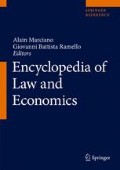Access this chapter
Tax calculation will be finalised at checkout
Purchases are for personal use only
References
Antonovics K, Knight B (2009) A new look at racial profiling: evidence from the Boston police department. Rev Econ Stat 91(1):163–177
Arizona v. Johnson (2009) 129 S. Ct. 781, 555 U.S. 323, 172 L. Ed. 2d 694
Berkemer v. McCarty (1984) 468 U.S. 420, 104 S. Ct. 3138, 82 L. Ed. 2d 317
Brown R, Frank J (2006) Race and officer decision making: examining differences in arrest outcomes between black and white officers. Justice Q 23(1):96–126
Carroll L, Gonzalez M (2014) Out of place: racial stereotypes and the ecology of frisks and searches following traffic stops. J Res Crime Delinq 51(5):559–584
Coviello D, Persico N (2015) An Economic analysis of black-white disparities in the New York police department’s stop-and-frisk program. J Leg Stud 44(2):315–360
Durlauf SN (2005) Racial profiling as a public policy question: efficiency, equity, and ambiguity. Am Econ Rev 95(2):132–136
Friedman M (2015) The role of race in police interdictions: evidence from the New York police department’s use of stop, question and frisk policing. Available at: https://ssrn.com/abstract=2689766
Fryer R (2016) An empirical analysis of racial differences in police use of force. No. w22399, National Bureau of Economic Research
Geller A, Fagan J (2010) Pot as pretext: marijuana, race, and the new disorder in New York City street policing. J Empir Leg Stud 7(4):591–633
Gelman A, Fagan J, Kiss A (2007) An analysis of the New York City police department’s “stop-and-frisk” policy in the context of claims of racial bias. J Am Stat Assoc 102(479):813–823
Gilliard-Matthews S, Kowalski B, Lundman R (2008) Officer race and citizen-reported traffic ticket decisions by police in 1999 and 2002. Police Q 11(2):202–219
Goel S, Rao JM, Shroff R (2016) Precinct or prejudice? Understanding racial disparities in New York City’s stop-and-frisk policy. Ann Appl Stat 10(1):365–394
Knowles J, Persico N, Todd P (2001) Racial bias in motor vehicle searches: theory and evidence. J Polit Econ 109(1):203–229
Minnesota v. Dickerson (1993) 508 U.S. 366, 113 S. Ct. 2130, 124 L. Ed. 2d 334
Novak K, Chamlin M (2012) Racial threat, suspicion, and police behavior: the impact of race and place in traffic enforcement. Crime Delinq 58(2):275–300
Persico N, Todd P (2006) Generalising the hit rates test for racial bias in law enforcement, with an application to vehicle searches in Wichita. Econ J 116(515):F351–F367
Ridgeway G (2007) Analysis of racial disparities in the New York police department’s stop, question and frisk practices. RAND Corporation, Santa Monica
Ritter J (2013) Racial bias in traffic stops: tests of a unified model of stops and searches. No. 152496, University of Minnesota, Department of Applied Economics
Rojek J, Rosenfeld R, Decker S (2004) The influence of driver’s race on traffic stops in Missouri. Police Q 7(1):126–147
Rosenfeld R, Rojek J, Decker S (2012) Age matters: race differences in police searches of young and older male drivers. J Res Crime Delinq 49(1):31–55
Ryan M (2016) Frisky business: race, gender and police activity during traffic stops. Eur J Law Econ 41(1):65–83
Schafer J, Carter D, Katz-Bannister A, Wells W (2006) Decision making in traffic stop encounters: a multivariate analysis of police behavior. Police Q 9(2):184–209
Sklansky D (2006) Not your father’s police department: making sense of the new demographics of law enforcement. J Crim Law Criminol 96(3):1209–1243
Skogan W, Frydl K (2004) Fairness and effectiveness in policing: the evidence. National Academies Press, Washington, DC
Terry v. Ohio (1968) 392 U.S. 1, 88 S. Ct. 1868, 20 L. Ed. 2d 889
Author information
Authors and Affiliations
Corresponding author
Editor information
Editors and Affiliations
Rights and permissions
Copyright information
© 2019 Springer Science+Business Media, LLC, part of Springer Nature
About this entry
Cite this entry
Ryan, M.E. (2019). Frisking. In: Marciano, A., Ramello, G.B. (eds) Encyclopedia of Law and Economics. Springer, New York, NY. https://doi.org/10.1007/978-1-4614-7753-2_685
Download citation
DOI: https://doi.org/10.1007/978-1-4614-7753-2_685
Published:
Publisher Name: Springer, New York, NY
Print ISBN: 978-1-4614-7752-5
Online ISBN: 978-1-4614-7753-2
eBook Packages: Economics and FinanceReference Module Humanities and Social SciencesReference Module Business, Economics and Social Sciences

